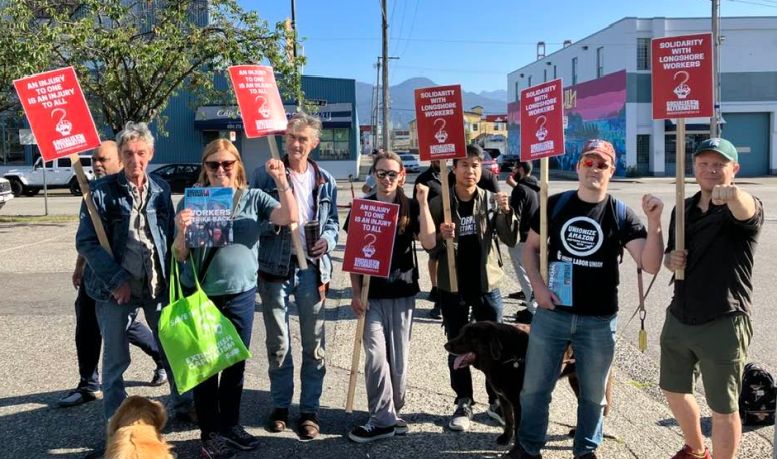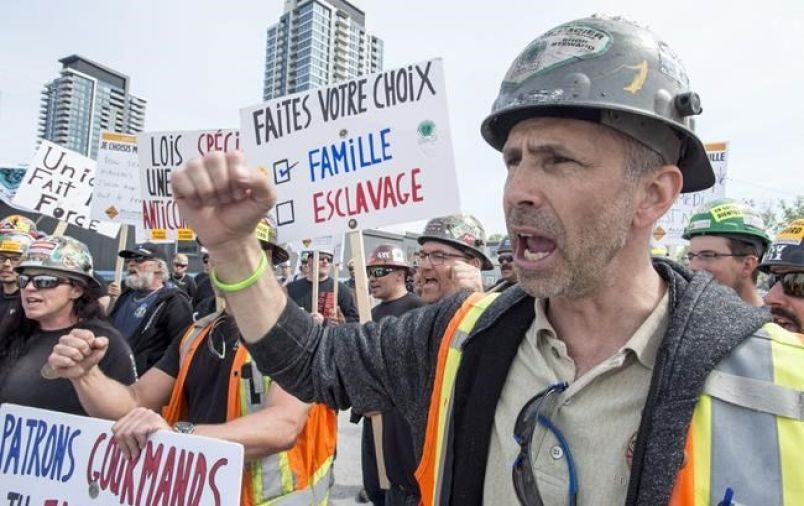Written by Socialist Alternative members in solidarity on the picket line.
At 8 am on Saturday, July 1, BC’s ports went quiet as longshore workers (ILWU) started their strike. They had voted 99.24 percent in favour of action, a powerful statement of intent. 7,400 workers are on strike. The previous contract had expired on March 30, and the employer, BC Maritime Employers Association (BCMEA), had not put forward reasonable proposals. The members felt strongly they had to show they were serious about wanting a contract that reflected their needs and concerns.
Socialist Alternative attended the picket line in East Vancouver in solidarity with ILWU. Workers said thanks for coming. In conversation their determination is clear, saying about being on strike, “It is what it is — we have to stand up for our rights.” Most expressed concern about the increasing “contracting-out” of jobs that ILWU members are skilled to do. This bypasses the union, takes jobs from those who are currently on the casual list and so makes it harder and longer for them to become full members with all the security and benefits.
Inflation has hit their wages, as with most other workers. The previous five-year contract increased the base rate by 3 percent in 2021 and 3.5 percent in 2022. This was clearly far below the rate of inflation and the union members rightly are looking to restore their living standards.
They worked all through COVID and, especially in the early months, it was scary going to work as it was difficult if not impossible to keep a safe physical distance. They were part of the “essential” workforce that kept society running in a time of emergency.
The third key area of dispute is over plans by the ports to increase automation, with the aim to “kill jobs” and boost profits. One worker said, “we don’t want to be replaced by robots.” The union’s view is that workers should not pay with their livelihoods for increased flow of cargo.
Workers expressed anger at the profits companies were making off the backs of workers — “gouging,” one said. The rich are getting richer while young workers, especially, “can barely afford a place to live.”
The union has enormous power. Around 16 percent of Canada’s traded goods passes through the ports — all handled by longshore workers. The longshore workers are employed by the Association, which represents 49 private companies that use the ports, including shipping lines and terminal operators.
Federal Government
Although longshore workers work for private companies, the vast majority of BC’s ports are owned by the federal government. This includes the 29 terminals in and around Vancouver, as well as ports in Nanaimo, Port Alberni and Prince Rupert.
Unfortunately, the ports are not run for the tens of thousands of workers who support the ports or for the communities living around them. Canadian Port Authorities are run like businesses, supporting employers.
Ports are federally regulated, and the workers are covered by federal legislation. The federal government has a history of interfering in the unions’ activities. In 2021 the Federal Liberals legislated 1,150 striking dock workers in Montréal, members of CUPE, back to work. This legislation is contrary to multiple Supreme Court rulings that back-to-work legislation is a violation of workers’ rights under the Charter. However, it takes years for the Supreme Court to make these rulings, long after disputes are over.
It is likely the employers are stonewalling on negotiations, hoping the Liberals will do the same in BC as they did two years ago in Québec.
Back-to-work legislation will pose a major question to the ILWU. Do they accept it as happened in Montréal or do they defy it? In Ontario, when Doug Ford introduced back-to-work legislation against school workers, invoking the “notwithstanding” clause to block a court challenge, the unions came together in solidarity with the threat of a general strike and Ford backed down. In 2014, the drivers who move the containers in and out of the Port of Vancouver were on strike. The BC government and the Port issued many threats including back-to-work legislation but the drivers, about 1,200 owner-operators and 300 employed workers, said they would not bend to the threats. The day before the back-to-work legislation would become law, the employers came back to negotiate a much-improved deal.
ILWU has a proud tradition of solidarity with other workers. They helped win BC’s $15 minimum wage, although it was not a direct benefit to their members, but to the wider working class. BC’s unions must support ILWU, if they need it.
Socialist Alternative is in solidarity with ILWU and echoes their slogan, “An injury to one is an injury to all.” Forward to victory.



